人教新目标(Go for it)版九年级全Unit 6 When was it invented?被动语态专题课件(共38张PPT)
文档属性
| 名称 | 人教新目标(Go for it)版九年级全Unit 6 When was it invented?被动语态专题课件(共38张PPT) |
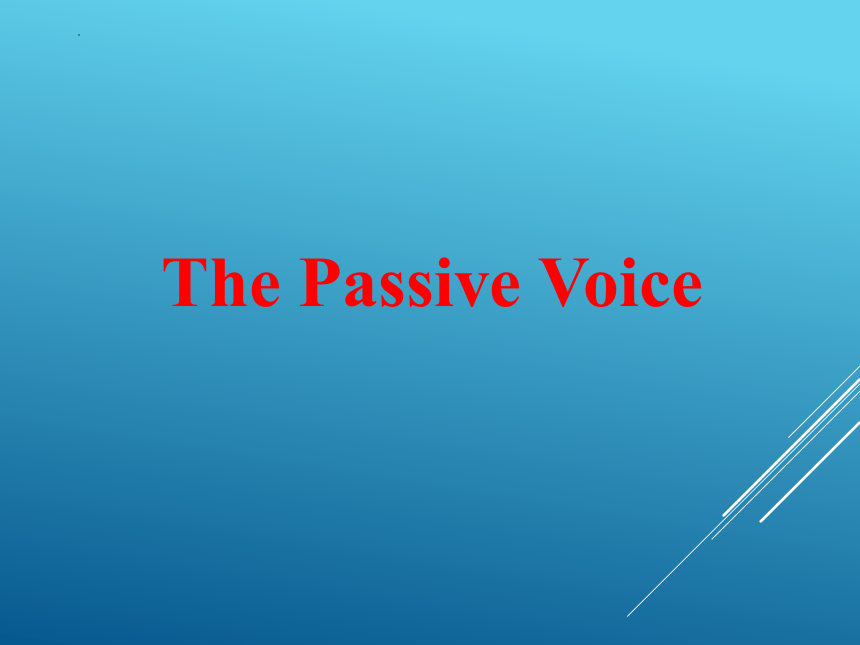
|
|
| 格式 | pptx | ||
| 文件大小 | 669.0KB | ||
| 资源类型 | 教案 | ||
| 版本资源 | 人教版(2019) | ||
| 科目 | 英语 | ||
| 更新时间 | 2022-03-27 00:00:00 | ||
图片预览

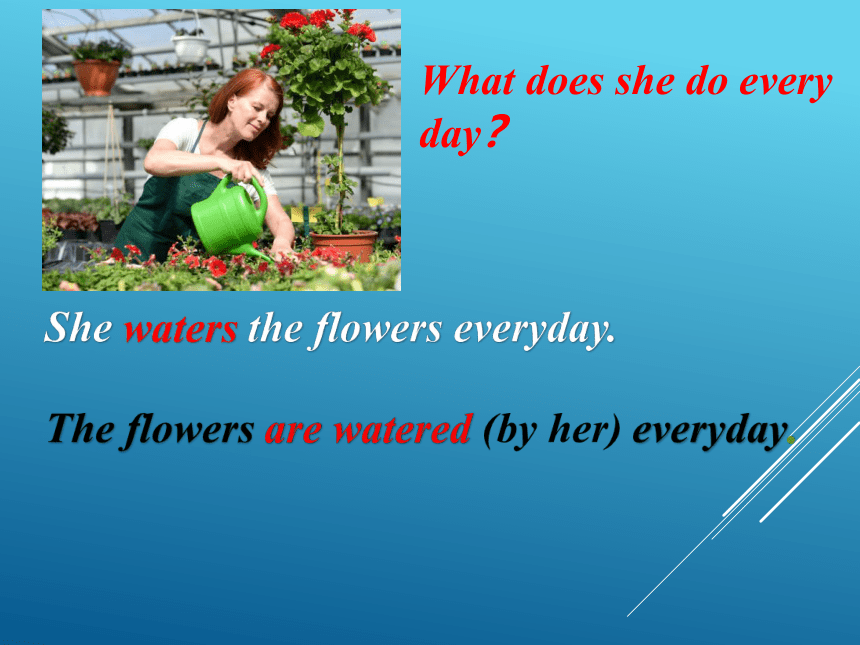

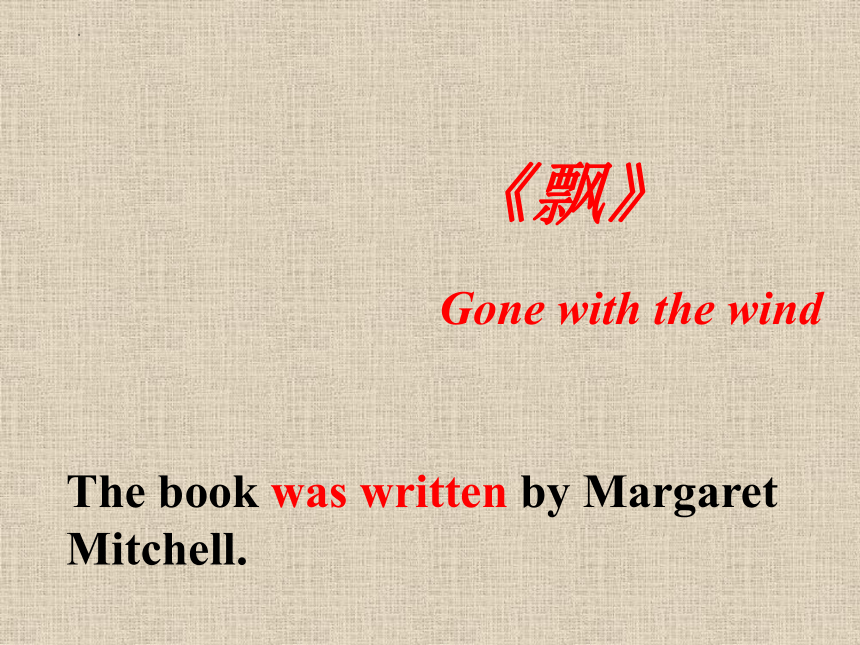

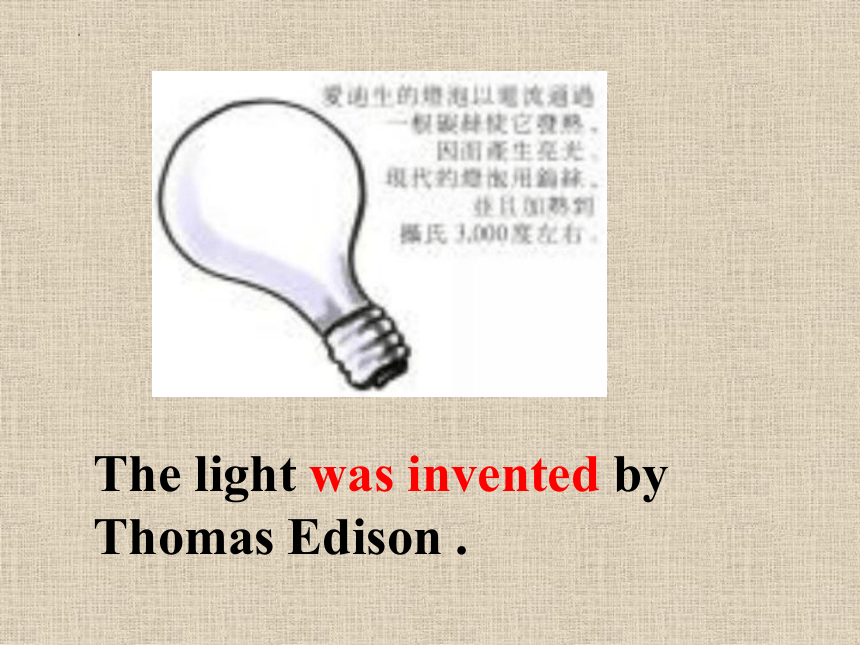
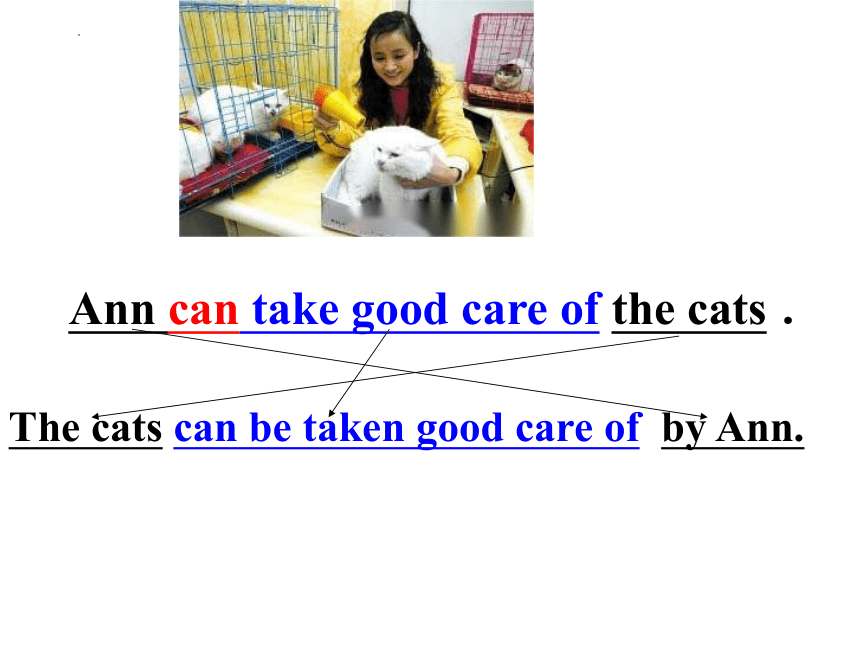
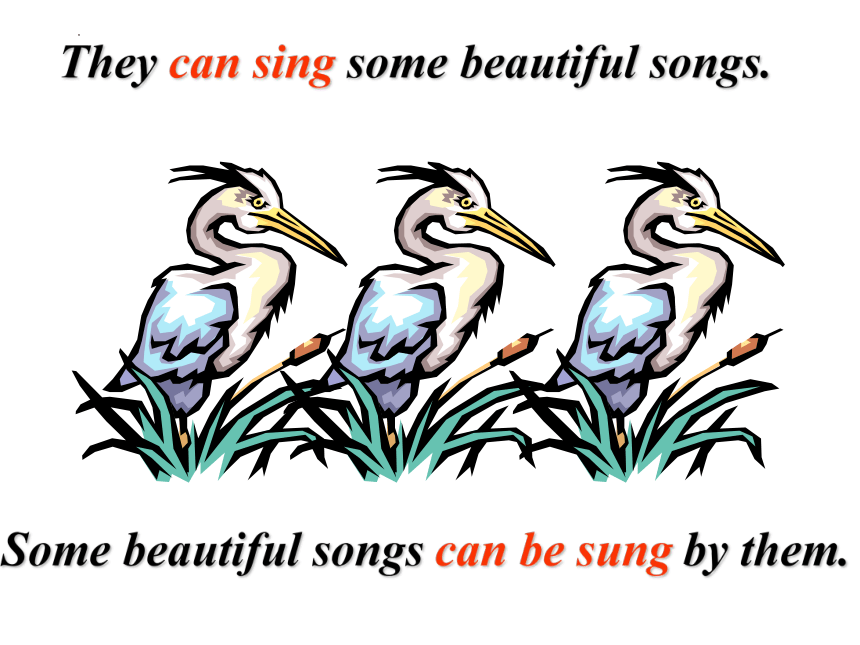
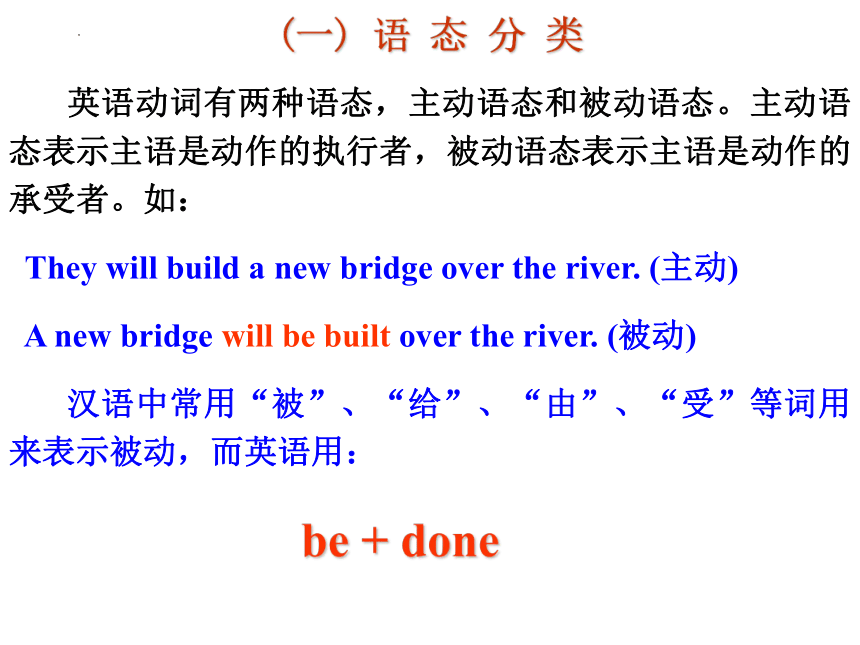
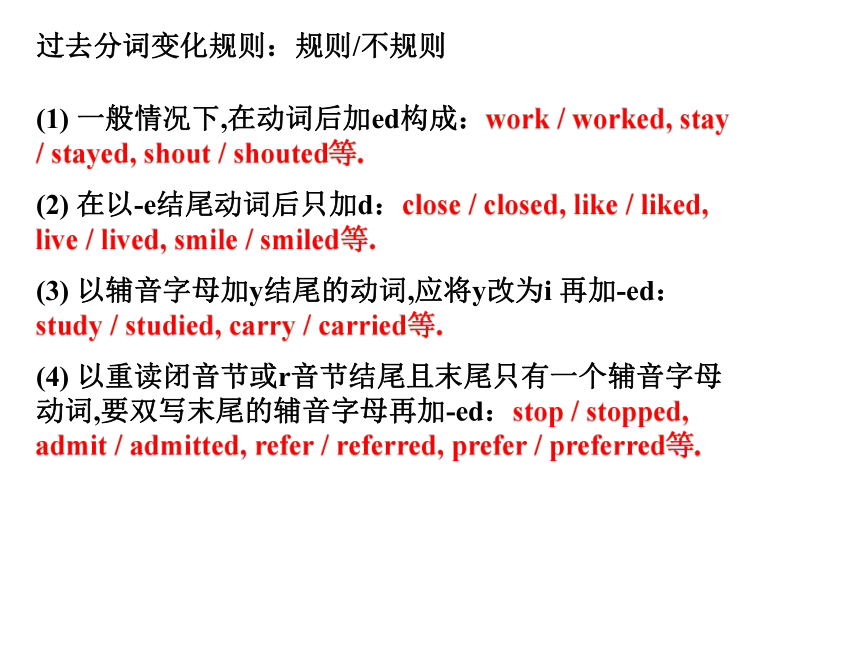
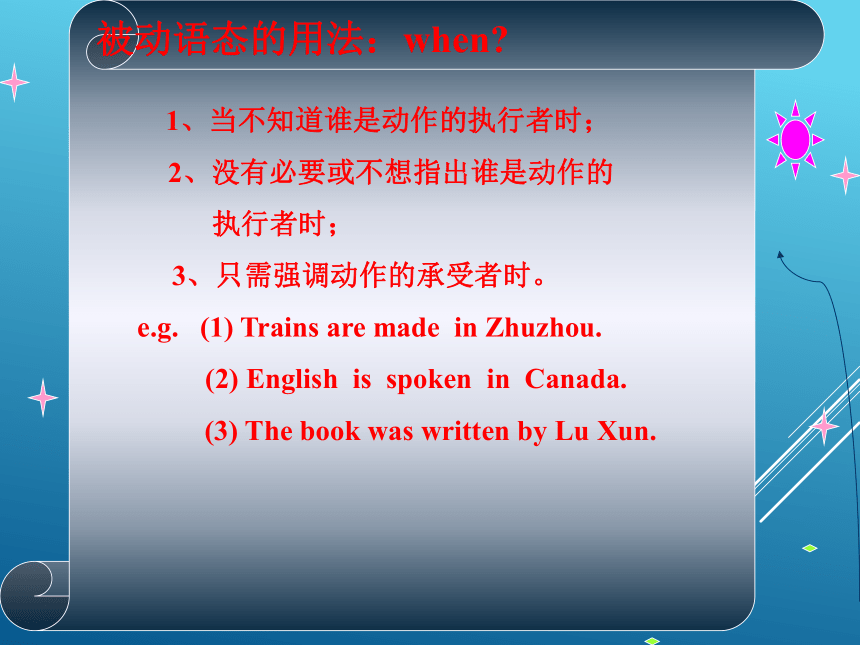
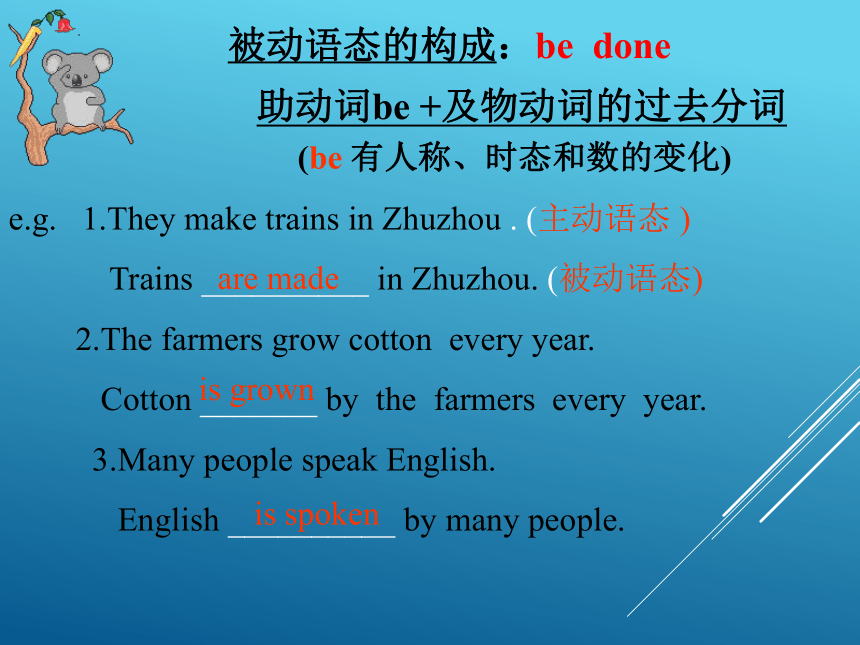
文档简介
(共38张PPT)
The Passive Voice
What does she do every day?
She waters the flowers everyday.
The flowers are watered (by her) everyday.
Sydney is visited by many tourists every year.
《飘》
The book was written by Margaret Mitchell.
Gone with the wind
The umbrella is used for keeping off the rain .
The light was invented by Thomas Edison .
Ann can take good care of the cats .
The cats can be taken good care of by Ann.
They can sing some beautiful songs.
Some beautiful songs can be sung by them.
(一) 语 态 分 类
英语动词有两种语态,主动语态和被动语态。主动语态表示主语是动作的执行者,被动语态表示主语是动作的承受者。如:
They will build a new bridge over the river. (主动)
A new bridge will be built over the river. (被动)
汉语中常用“被”、“给”、“由”、“受”等词用来表示被动,而英语用:
be + done
过去分词变化规则:规则/不规则
(1) 一般情况下,在动词后加ed构成:work / worked, stay / stayed, shout / shouted等.
(2) 在以-e结尾动词后只加d:close / closed, like / liked, live / lived, smile / smiled等.
(3) 以辅音字母加y结尾的动词,应将y改为i 再加-ed:study / studied, carry / carried等.
(4) 以重读闭音节或r音节结尾且末尾只有一个辅音字母动词,要双写末尾的辅音字母再加-ed:stop / stopped, admit / admitted, refer / referred, prefer / preferred等.
被动语态的用法:when
1、当不知道谁是动作的执行者时;
2、没有必要或不想指出谁是动作的
执行者时;
3、只需强调动作的承受者时。
e.g. (1) Trains are made in Zhuzhou.
(2) English is spoken in Canada.
(3) The book was written by Lu Xun.
助动词be +及物动词的过去分词
e.g. 1.They make trains in Zhuzhou . (主动语态 )
Trains __________ in Zhuzhou. (被动语态)
2.The farmers grow cotton every year.
Cotton _______ by the farmers every year.
3.Many people speak English.
English __________ by many people.
are made
is grown
is spoken
被动语态的构成:be done
(be 有人称、时态和数的变化)
(二) 被动语态的时态、人称和数的变化
主要体现在be的变化上,其形式与系动词be的变化形式完全一样。以 give 为例,列表如下:
一般现在时:
一般过去时:
一般将来时:
含有情态动词
现在进行时:
过去进行时:
现在完成时:
过去完成时:
[注]被动语态没有将来进行时和过去将来进行时。
am / is / are + done
was / were + done
shall / will + be done
can/must + be done
am / is / are + being + done
was / were + being + done
have / has + been + done
had + been + done
1.一般现在时被动语态的构成:
1. She often cleans the house.
The house ____________ by her.
is often cleaned
are planted
am/is/are+动词的过去分词
2.We plant trees in spring every year.
Trees _________ by us in spring every year.
2.一般过去时被动语态的构成:
e.g 1. They built the house last year.
The house _________last year.
was built
were taken
was/were+动词的过去分词
2. Mike took these photos in the park.
These photos _________ by Mike in the par
have / has + been + V(p.p.)
1. He has invited all his friends to his party.
All his friends have been invited to his party.
2. The thief has stolen all the money.
The money has been stolen by the thief.
3.现在完成时被动语态的构成:
a bird, catch,
by the boy
A bird has been caught by the boy.
A dog, examine, three times, by the doctor
A dog has been examined three times by the doctor.
my leg, bite
My leg has been bitten.
my foot, cut
My foot has been cut.
two singer stars , invite, party
Two singer stars have been invited to this city.
4.含有情态动词的被动语态:
e.g 1. They must build a hotel in the town.
A hotel __________ by them in the town.
must be built
情态动词+ be +动词的过去分词
用所给动词的正确时态和语态填空:
1.Sandy ____________(think) to be the best student in his class.
2. The children __________(take) good care of in the kindergarden
3. This book _________ ( cost ) you ten yuan.
4.This book ______________ ( must return) to the library on time.
5.The Chinese Communist Party ___________(found) in July,1921.
is thought
are taken
cost
must be returned
was founded
5. 一般将来时: will be done
(1)They will send cars abroad by sea.
Cars will be sent abroad by sea.
(2)They will give plenty of jobs to school-leavers.
Plenty of jobs will be given to school-leavers.
5. 现在进行时:
The radio is broadcasting English lessons.
English lessons are being broadcasted on the radio.
We are painting the rooms.
The rooms are being painted.
6. 过去进行时:
— Why didn't they drive there on time
— Because the workers were mending the road.
Because the road was being mended.
This time last year we were planting trees here.
Trees were being planted here this time last year.
被 动 语 态 的 使 用
1.当不知道或没有必要指出动作的执行者时,常用被动语态,这时往往不用by 短语。
“Mr. White, the cup was broken after class. ”
2.突出或强调动作的承受者,如果需要说出动作的执行者,用by 短语。
These records were made by John Denver.
The cup was broken by Paul.
3.当汉语句子的主语既不是动作的执行者,也不是动作的承受者时,这时常用in + 名词作状语,而代替 by 短语。
These cars were made in China.
15, 000 cars will be produced each year in the new factory.
主动语态变被动语态的方法
(1) My aunt invited me to her dinner party.
主语 谓语 宾语
→ I was invited (by my aunt ) to her dinner party.
主语 谓语 宾语
(2) The school set up a special class to help poor readers.
→ A special class to help poor readers was set up in the school.
语态转换时所注意的问题
1. 把主动语态变为被动语态时,其谓语动词的时态要与原句时态保持一致,其谓语动词的数要与新主语保持一致。
We have bought a new computer.
A new computer has been bought. (正确)
A new computer have been bought. (错误)
2. 含有双宾语的主动句变被动句时,可分别将其中的一个宾语变为主语,另一个不动,一般变间接宾语为主语时比较多。
My uncle gave me a present on my birthday.
I was given a present on my birthday.
A present was given to me yesterday.
注意:1.一般在下列动词后,常在间接宾语前用介词 to,如:
bring, give, hand, lend, offer, pass, pay, promise, sell, show, take, teach, tell 等。
(1) The book was showed to the class.
(2) My bike was lent to her.
2.一般在下列动词后,间接宾语前用介词 for, 如:
build, buy, cook, cut, choose, do, fetch, find, fix, get, keep, make, order, paint, play, sing 等。
(1) A new skirt was made for me.
(2) The meat was cooked for us.
(3) Some country music was played for us.
3. She told us to follow her instructions.
→We were told to follow her instructions.
注意:在see, watch, hear, notice, listen to, look at, make, feel等动词后作宾语补足语的动词不定式都不带 to,但改成被动语态后都带to,这时不定式为主语补足语,也就是说不定式作主语补足语不存在省略to 的问题。
We often hear him play the guitar.
→He is often heard to play the guitar.
4. 有些动词既是及物又是不及物,当它们和well, badly, easily等副词连用时,表示主语内在品质或性能,是不及物动词,用主动表示被动,这时不用被动语态,常见的有:write, read, clean, sell, wash, cook 等。如:
(1)The cloth washes easily. 这布很好洗。
(2)The new product sells well. 这新产品很畅销。
对比:
The books sell well. (主动句)
The books were sold out. (被动句)
The meat didn’t cook well. (主动句)
The meat was cooked for a long time. (被动句)
5.下列情况主动句不能改为被动句:
感官系动词一般用主动形式表示被动意义,如:feel,look, seem, taste, sound, remain等。
(1)— Do you like the material — Yes, it feels very soft.
误:It is felt very soft.
(2)The food tastes delicious.
误:The food is tasted delicious.
6.在汉语中,有一类句子不出现主语,在英语中一般可用被动结构来表示,例如:
1) It is reported that it is going to rain tomorrow.
2) It is well known that Thomas Edison invented the electric lamp.
据说……It is said that … 据报导…… It is reported that …
据推测…… It is supposed that … 希望…… It is hoped that …
众所周知… It is well known that …
普遍认为… It is generally considered that …
有人建议… It is suggested that …
Change the following sentences into the Passive Voice
1.They make TV sets in that factory .
2.Northwest China grows the best cotton .
3.They use this room for playing Ping pong .
4.Bell invented the telephone in 1876.
TV sets are made in that factory
The best cotton is grown in Northwest China .
This room is used for playing Ping pong
The telephone was invented by Bell in 1876.
5.The manager made them work 10 hours a day .
6.China has sent up man –made satellites into space
7. You should water trees often .
8.You must not plant trees in very dry earth .
They were made to work 10 hours a day.
Man –made satellites have been sent up into space .
Trees should be watered often .
Trees must not be planted in very dry earth .
Fill in the blanks:
Paper ( invent)_______________in A.D.105 by Cai Lun in China.It is an important part of our everyday lives,but few people ever think about how it (make) ____________.Today most paper comes from trees.However,with the concern for the environment (考虑到环境) , more and more paper(produce)____________from recycled paper products.Since paper products are of different qualities,they first(sort分类)____________before they (recycle)_____________.The sorted material (put) _____________into a huge machine.
was invented
is made
is produced
are sorted
are recycled
is put
Thanks!
The Passive Voice
What does she do every day?
She waters the flowers everyday.
The flowers are watered (by her) everyday.
Sydney is visited by many tourists every year.
《飘》
The book was written by Margaret Mitchell.
Gone with the wind
The umbrella is used for keeping off the rain .
The light was invented by Thomas Edison .
Ann can take good care of the cats .
The cats can be taken good care of by Ann.
They can sing some beautiful songs.
Some beautiful songs can be sung by them.
(一) 语 态 分 类
英语动词有两种语态,主动语态和被动语态。主动语态表示主语是动作的执行者,被动语态表示主语是动作的承受者。如:
They will build a new bridge over the river. (主动)
A new bridge will be built over the river. (被动)
汉语中常用“被”、“给”、“由”、“受”等词用来表示被动,而英语用:
be + done
过去分词变化规则:规则/不规则
(1) 一般情况下,在动词后加ed构成:work / worked, stay / stayed, shout / shouted等.
(2) 在以-e结尾动词后只加d:close / closed, like / liked, live / lived, smile / smiled等.
(3) 以辅音字母加y结尾的动词,应将y改为i 再加-ed:study / studied, carry / carried等.
(4) 以重读闭音节或r音节结尾且末尾只有一个辅音字母动词,要双写末尾的辅音字母再加-ed:stop / stopped, admit / admitted, refer / referred, prefer / preferred等.
被动语态的用法:when
1、当不知道谁是动作的执行者时;
2、没有必要或不想指出谁是动作的
执行者时;
3、只需强调动作的承受者时。
e.g. (1) Trains are made in Zhuzhou.
(2) English is spoken in Canada.
(3) The book was written by Lu Xun.
助动词be +及物动词的过去分词
e.g. 1.They make trains in Zhuzhou . (主动语态 )
Trains __________ in Zhuzhou. (被动语态)
2.The farmers grow cotton every year.
Cotton _______ by the farmers every year.
3.Many people speak English.
English __________ by many people.
are made
is grown
is spoken
被动语态的构成:be done
(be 有人称、时态和数的变化)
(二) 被动语态的时态、人称和数的变化
主要体现在be的变化上,其形式与系动词be的变化形式完全一样。以 give 为例,列表如下:
一般现在时:
一般过去时:
一般将来时:
含有情态动词
现在进行时:
过去进行时:
现在完成时:
过去完成时:
[注]被动语态没有将来进行时和过去将来进行时。
am / is / are + done
was / were + done
shall / will + be done
can/must + be done
am / is / are + being + done
was / were + being + done
have / has + been + done
had + been + done
1.一般现在时被动语态的构成:
1. She often cleans the house.
The house ____________ by her.
is often cleaned
are planted
am/is/are+动词的过去分词
2.We plant trees in spring every year.
Trees _________ by us in spring every year.
2.一般过去时被动语态的构成:
e.g 1. They built the house last year.
The house _________last year.
was built
were taken
was/were+动词的过去分词
2. Mike took these photos in the park.
These photos _________ by Mike in the par
have / has + been + V(p.p.)
1. He has invited all his friends to his party.
All his friends have been invited to his party.
2. The thief has stolen all the money.
The money has been stolen by the thief.
3.现在完成时被动语态的构成:
a bird, catch,
by the boy
A bird has been caught by the boy.
A dog, examine, three times, by the doctor
A dog has been examined three times by the doctor.
my leg, bite
My leg has been bitten.
my foot, cut
My foot has been cut.
two singer stars , invite, party
Two singer stars have been invited to this city.
4.含有情态动词的被动语态:
e.g 1. They must build a hotel in the town.
A hotel __________ by them in the town.
must be built
情态动词+ be +动词的过去分词
用所给动词的正确时态和语态填空:
1.Sandy ____________(think) to be the best student in his class.
2. The children __________(take) good care of in the kindergarden
3. This book _________ ( cost ) you ten yuan.
4.This book ______________ ( must return) to the library on time.
5.The Chinese Communist Party ___________(found) in July,1921.
is thought
are taken
cost
must be returned
was founded
5. 一般将来时: will be done
(1)They will send cars abroad by sea.
Cars will be sent abroad by sea.
(2)They will give plenty of jobs to school-leavers.
Plenty of jobs will be given to school-leavers.
5. 现在进行时:
The radio is broadcasting English lessons.
English lessons are being broadcasted on the radio.
We are painting the rooms.
The rooms are being painted.
6. 过去进行时:
— Why didn't they drive there on time
— Because the workers were mending the road.
Because the road was being mended.
This time last year we were planting trees here.
Trees were being planted here this time last year.
被 动 语 态 的 使 用
1.当不知道或没有必要指出动作的执行者时,常用被动语态,这时往往不用by 短语。
“Mr. White, the cup was broken after class. ”
2.突出或强调动作的承受者,如果需要说出动作的执行者,用by 短语。
These records were made by John Denver.
The cup was broken by Paul.
3.当汉语句子的主语既不是动作的执行者,也不是动作的承受者时,这时常用in + 名词作状语,而代替 by 短语。
These cars were made in China.
15, 000 cars will be produced each year in the new factory.
主动语态变被动语态的方法
(1) My aunt invited me to her dinner party.
主语 谓语 宾语
→ I was invited (by my aunt ) to her dinner party.
主语 谓语 宾语
(2) The school set up a special class to help poor readers.
→ A special class to help poor readers was set up in the school.
语态转换时所注意的问题
1. 把主动语态变为被动语态时,其谓语动词的时态要与原句时态保持一致,其谓语动词的数要与新主语保持一致。
We have bought a new computer.
A new computer has been bought. (正确)
A new computer have been bought. (错误)
2. 含有双宾语的主动句变被动句时,可分别将其中的一个宾语变为主语,另一个不动,一般变间接宾语为主语时比较多。
My uncle gave me a present on my birthday.
I was given a present on my birthday.
A present was given to me yesterday.
注意:1.一般在下列动词后,常在间接宾语前用介词 to,如:
bring, give, hand, lend, offer, pass, pay, promise, sell, show, take, teach, tell 等。
(1) The book was showed to the class.
(2) My bike was lent to her.
2.一般在下列动词后,间接宾语前用介词 for, 如:
build, buy, cook, cut, choose, do, fetch, find, fix, get, keep, make, order, paint, play, sing 等。
(1) A new skirt was made for me.
(2) The meat was cooked for us.
(3) Some country music was played for us.
3. She told us to follow her instructions.
→We were told to follow her instructions.
注意:在see, watch, hear, notice, listen to, look at, make, feel等动词后作宾语补足语的动词不定式都不带 to,但改成被动语态后都带to,这时不定式为主语补足语,也就是说不定式作主语补足语不存在省略to 的问题。
We often hear him play the guitar.
→He is often heard to play the guitar.
4. 有些动词既是及物又是不及物,当它们和well, badly, easily等副词连用时,表示主语内在品质或性能,是不及物动词,用主动表示被动,这时不用被动语态,常见的有:write, read, clean, sell, wash, cook 等。如:
(1)The cloth washes easily. 这布很好洗。
(2)The new product sells well. 这新产品很畅销。
对比:
The books sell well. (主动句)
The books were sold out. (被动句)
The meat didn’t cook well. (主动句)
The meat was cooked for a long time. (被动句)
5.下列情况主动句不能改为被动句:
感官系动词一般用主动形式表示被动意义,如:feel,look, seem, taste, sound, remain等。
(1)— Do you like the material — Yes, it feels very soft.
误:It is felt very soft.
(2)The food tastes delicious.
误:The food is tasted delicious.
6.在汉语中,有一类句子不出现主语,在英语中一般可用被动结构来表示,例如:
1) It is reported that it is going to rain tomorrow.
2) It is well known that Thomas Edison invented the electric lamp.
据说……It is said that … 据报导…… It is reported that …
据推测…… It is supposed that … 希望…… It is hoped that …
众所周知… It is well known that …
普遍认为… It is generally considered that …
有人建议… It is suggested that …
Change the following sentences into the Passive Voice
1.They make TV sets in that factory .
2.Northwest China grows the best cotton .
3.They use this room for playing Ping pong .
4.Bell invented the telephone in 1876.
TV sets are made in that factory
The best cotton is grown in Northwest China .
This room is used for playing Ping pong
The telephone was invented by Bell in 1876.
5.The manager made them work 10 hours a day .
6.China has sent up man –made satellites into space
7. You should water trees often .
8.You must not plant trees in very dry earth .
They were made to work 10 hours a day.
Man –made satellites have been sent up into space .
Trees should be watered often .
Trees must not be planted in very dry earth .
Fill in the blanks:
Paper ( invent)_______________in A.D.105 by Cai Lun in China.It is an important part of our everyday lives,but few people ever think about how it (make) ____________.Today most paper comes from trees.However,with the concern for the environment (考虑到环境) , more and more paper(produce)____________from recycled paper products.Since paper products are of different qualities,they first(sort分类)____________before they (recycle)_____________.The sorted material (put) _____________into a huge machine.
was invented
is made
is produced
are sorted
are recycled
is put
Thanks!
同课章节目录
- Unit 1 How can we become good learners.
- Section A
- Section B
- Unit 2 I think that mooncakes are delicious!
- Section A
- Section B
- Unit 3 Could you please tell me where the restroom
- Section A
- Section B
- Unit 4 I used to be afraid of the dark.
- Section A
- Section B
- Unit 5 What are the shirts made of?
- Section A
- Section B
- Review of Units 1-5
- Unit 6 When was it invented?
- Section A
- Section B
- Unit 7 Teenagers should be allowed to choose their
- Section A
- Section B
- Unit 8 It must belong to Carla.
- Section A
- Section B
- Unit 9 I like music that I can dance to.
- Section A
- Section B
- Unit 10 You're supposed to shake hands.
- Section A
- Section B
- Review of Units 6-10
- Unit 11 Sad movies make me cry.
- Section A
- Section B
- Unit 12 Life is full of the unexpected
- Section A
- Section B
- Unit 13 We're trying to save the earth!
- Section A
- Section B
- Unit 14 I remember meeting all of you in Grade 7.
- Section A
- Section B
- Review of Units 11-14
